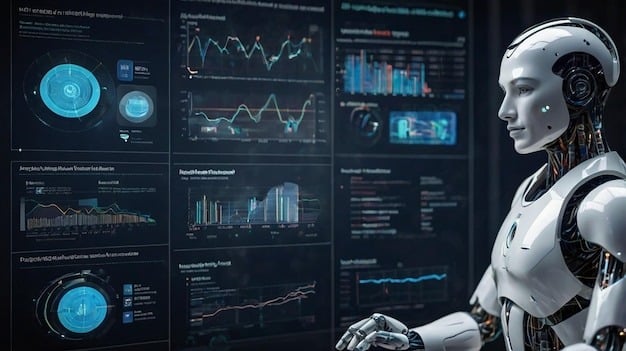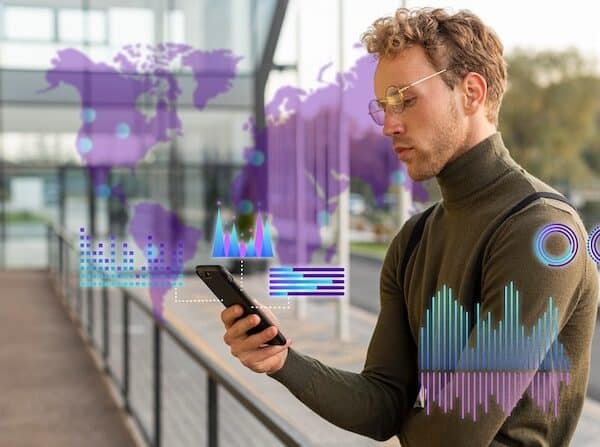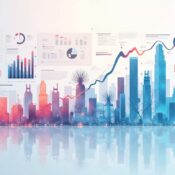Artificial Intelligence Predictive Analytics: with Rapid Phone Center

Artificial Intelligence Predictive Analytics: with Rapid Phone Center
Unlock the future with artificial intelligence and predictive analytics ⚡ Explore how they transform business intelligence and big data insights.
In today’s fast-paced technological landscape, artificial intelligence (AI) and predictive analytics are two powerful forces reshaping the way businesses operate. At Rapid Phone Center, we recognize the importance of leveraging these technologies to enhance customer experiences, streamline operations, and drive strategic decision-making. This comprehensive guide will delve into the relationship between AI and predictive analytics, their applications in business intelligence, and how they can benefit.

Predictive Analytics Machine Learning Artificial Intelligence
Artificial intelligence refers to the simulation of human intelligence processes by machines, particularly computer systems. These processes include learning (the acquisition of information and rules for using it), reasoning (using rules to reach approximate or definite conclusions), and self-correction. AI encompasses various subfields, including machine learning (ML), natural language processing (NLP), robotics, and more.
Predictive analytics involves using statistical techniques and algorithms to analyze historical data and predict future outcomes. By identifying patterns and trends, organizations can make informed decisions, mitigate risks, and seize opportunities before they arise. Predictive analytics relies heavily on data mining, machine learning, and big data to deliver actionable insights. Harness the power of Machine Learning Predictive Analytics at Rapid Phone Center to drive smarter decisions and enhance customer insights.
AI enhances predictive analytics by enabling systems to learn from data and improve their predictions over time. This synergy results in more accurate forecasts and deeper insights. For example, AI can automate the analysis of vast datasets, identifying complex patterns that might be missed.
At Rapid Phone Center, we empower businesses through advanced business intelligence predictive analytics solutions. Our business intelligence tools provide actionable insights by analyzing historical data, helping organizations make informed decisions. Meanwhile, our predictive analytics capabilities forecast future trends and behaviors, allowing companies to anticipate market changes. Together, these technologies enhance operational efficiency, drive strategic planning, and improve customer satisfaction, ensuring sustainable growth.

Big Data Business Intelligence Predictive Analytics
While predictive analytics focuses primarily on forecasting future events based on historical data, artificial intelligence encompasses a broader range of functionalities, including reasoning and learning. In many cases, the two disciplines overlap, as AI can be employed to enhance predictive models. However, it’s essential to recognize their distinctions to deploy them effectively within.
Business intelligence (BI) refers to the technologies and strategies used by enterprises for data analysis and management. BI helps organizations make data-driven decisions by providing insights into performance, trends, and market opportunities.
At Rapid Phone Center, we harness the power of predictive analytics artificial intelligence to transform how businesses interact with customers. Our predictive analytics tools analyze historical data to forecast trends, enabling proactive decision-making. Coupled with artificial intelligence, which automates processes and provides intelligent insights, we empower businesses to enhance efficiency, improve customer experiences, and drive growth through informed strategies and innovation. Rapid Phone Center is dedicated to Boosting Citizen Engagement, fostering connections and enhancing communication with the community.
At Rapid Phone Center, we specialize in integrating artificial intelligence predictive analysis to elevate business operations. Our advanced AI technologies streamline processes, enabling businesses to automate routine tasks while enhancing decision-making. By employing predictive analysis, we analyze historical data to uncover trends and forecast future outcomes. This powerful combination helps businesses optimize performance, improve customer engagement, and drive sustainable growth in a competitive landscape.

Predictive Analytics in Business Intelligence
Integrating predictive analytics into business intelligence frameworks allows organizations to forecast future trends and behaviors. This combination enables proactive decision-making rather than reactive strategies, empowering businesses to stay ahead of their competitors.
Using predictive analytics in business intelligence can significantly enhance the capabilities of BI tools. For example, by employing AI-driven predictive analytics software, organizations can:
- Forecast Sales Trends: Predictive models can analyze historical sales data and external factors to forecast future sales, helping businesses adjust their strategies accordingly.
- Identify Customer Segments: Organizations can utilize predictive analytics to identify and target specific customer segments based on their behavior, preferences, and buying patterns.
- Optimize Marketing Campaigns: By predicting customer responses to marketing initiatives, businesses can tailor their campaigns for maximum impact.
Machine learning, a subset of AI, plays a critical role in predictive analytics. By leveraging predictive analytics machine learning, organizations can develop models that improve their accuracy and effectiveness over time. Machine learning algorithms can analyze data, learn from it, and make predictions without being explicitly programmed to perform the task. Transform your business with Rapid Phone Center’s Analytics for Retail, delivering insights that drive sales and improve.

Artificial Intelligence in Predictive Analytics
The integration of artificial intelligence in predictive analytics leads to more sophisticated models capable of processing complex datasets. AI-powered predictive analytics solutions can uncover hidden patterns and correlations that traditional methods may overlook, providing organizations.
It’s essential to understand the distinctions between artificial intelligence vs. predictive analytics. While AI focuses on enabling machines to perform tasks that typically require human intelligence, predictive analytics is specifically concerned with forecasting future events. Both technologies complement each other but serve different purposes. Discover Rapid Phone Center’s AI Customer Service, where innovative technology meets exceptional support for a seamless experience!
Similarly, understanding the difference between business intelligence vs. predictive analytics is crucial for effective implementation. Business intelligence encompasses a broader spectrum of data analysis and reporting, while predictive analytics focuses on forecasting and anticipating future trends. Combining these two approaches can lead to more informed decision-making.
At Rapid Phone Center, we leverage artificial intelligence predictive analytics to revolutionize customer interactions and enhance operational efficiency. Our AI solutions automate routine tasks and provide intelligent insights, while predictive analytics analyzes historical data to forecast future trends. This powerful combination allows businesses to make data-driven decisions, optimize processes, and deliver personalized experiences, ultimately driving growth and customer satisfaction.

Predictive Analytics and Artificial Intelligence: Driving Innovation in Decision-Making
Begin by identifying the specific business objectives you want to achieve through predictive analytics and AI. Whether it’s improving customer satisfaction, increasing sales, or optimizing inventory management, having clear goals will guide your implementation strategy.
Data is the backbone of predictive analytics. Collect relevant historical data from various sources, including customer interactions, sales records, and market trends. Ensure your data is clean, organized, and ready for analysis. Streamline your operations with Rapid Phone Center’s Back Office Services, providing efficient support for your business needs!
Select predictive analytics artificial intelligence software that aligns with your business needs. Consider factors such as scalability, ease of use, and the ability to integrate with existing systems.
At Rapid Phone Center, we bridge the gap between technology and customer service. Understanding artificial intelligence vs predictive analytics is key for businesses today. AI simulates human intelligence to enhance decision-making and automate tasks, while predictive analytics uses data and statistical algorithms to identify future outcomes. By integrating both technologies, we help businesses optimize operations and improve customer experiences, driving growth and innovation.
predictive analytics vs artificial intelligence
Utilize machine learning algorithms to create predictive models based on your data. Test different models to determine which provides the most accurate predictions for your business objectives.

At Rapid Phone Center, we empower businesses with insights through our comprehensive solutions. Understanding the difference between business intelligence vs predictive analytics is crucial for data-driven decision-making. BI focuses on analyzing historical data to inform current strategies, while predictive analytics leverages statistical models and machine learning to forecast future trends. Enhance your operations with our expert services in both areas for optimal growth.
At Rapid Phone Center, we believe that harnessing the power of artificial intelligence and predictive analytics can revolutionize your business. By integrating these technologies into your operations, you can enhance decision-making, improve customer experiences, and gain a competitive edge in the marketplace. As the landscape of technology continues to evolve, staying ahead of the curve with AI and predictive analytics will be crucial for long-term success. Embrace the future and unlock the potential of your business today!
At Rapid Phone Center, we harness the power of predictive analytics business intelligence to drive informed decision-making and enhance operational efficiency. Our predictive analytics solutions analyze historical data to uncover trends and forecast future outcomes, enabling businesses to stay ahead of the competition. Coupled with robust business intelligence tools, we provide actionable insights that empower organizations to optimize strategies, improve customer engagement, and foster sustainable growth. Enhance your online store with Rapid Phone Center’s Ecommerce Fulfillment services, ensuring fast, reliable delivery for your customers!
Frequently Asked Questions
Explore Rapid Phone Center’s FAQs on artificial intelligence predictive analytics, answering your queries for better insights and solutions!
What is predictive analytics?
Predictive analytics refers to the use of statistical algorithms and machine learning techniques to identify the likelihood of future outcomes based on historical data. It helps organizations make data-driven decisions by predicting trends and behaviors.

How does AI enhance predictive analytics?
AI enhances predictive analytics by automating data analysis, improving model accuracy, and enabling the processing of large datasets. Machine learning algorithms can learn from data patterns, improving predictions over time without human intervention.
What types of data are used in predictive analytics?
Predictive analytics utilizes structured data (like databases and spreadsheets) and unstructured data (like text, images, and social media) to uncover insights. Common data sources include customer transaction histories, web behavior, social media interactions, and sensor data.
What industries benefit from predictive analytics?
Predictive analytics is widely used across various industries, including finance (risk assessment), healthcare (patient outcomes), marketing (customer segmentation), retail (inventory management), and manufacturing (predictive maintenance).
You might also want to explore the offerings we provide:
Thanks, Good Luck to You 🌊




